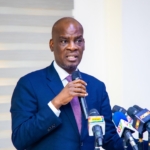
Minister of Education, Haruna Iddrisu, has revealed that his ministry is finalising a cabinet memo seeking approval to amend the current Presidential Charter system to make charter acquisition optional for private universities.
The proposal follows long-standing complaints from private tertiary institutions about what they describe as a restrictive and cumbersome chartering process.
A Presidential Charter is the highest accreditation status available to tertiary institutions in Ghana, granting full autonomy to award degrees and certificates. However, many private universities argue that the existing system limits innovation and slows their ability to function effectively.
Speaking to journalists at a stakeholder engagement on the report by the Kwaku Ansa-Asare Committee in Accra, Mr Iddrisu said the ministry is almost ready with a memo seeking Cabinet approval for the amendment.
“I will get a Cabinet memo or, probably, given the exigency of time, an executive approval from President John Dramani Mahama to amend Act 102(3) of 2020 and to make chartering optional, even though earlier we pronounced that we will give a moratorium of 10 years based on the Ansa-Asare Committee report and its recommendation.”
The Minister also noted that it was important to recognise the contribution of private universities to Ghana’s education system.
“We need to recognise what private universities have done in complementing the government in expanding access to higher education. Our policy remains an emphasis on what I call the ARQ: access, relevance, and quality.
“We’ll strengthen oversight using GTEC, the Tertiary Education Commission. Oversight will strengthen quality assurance. No compromise on minimum standards.”
Chairman of Parliament’s Select Committee on Education, Peter Nortsu-Kotoe, welcomed the proposal and described it as long overdue.
He said the current chartering framework continues to hinder the smooth running of private universities and that introducing flexibility through an amendment will better position them to thrive.
“As a Committee on Education, during our tour of the country in May this year, we visited a number of private universities, both chartered and non-chartered, and we listened to them, the owners, we listened to students, and we have come to the conclusion that charter should be optional, and that is the position of the Committee on Education.”
“The ranking member on the Committee on Education, Dr Yaw Adutwum, also came out with the same position that we should not force charter on private universities,” he added.
Mr Nortsu-Kotoe further stated the financial value private universities provide to the state.
“Research has shown that for every student at the tertiary level who goes to a private school, the government saves about GH₵50,000 on that student. So you can see the role private universities are playing in the development of education in the country.”
He added that the scale of enrolment in private institutions means the government would struggle to provide infrastructure if those students depended solely on public universities.
“If you look at the number, even one private university, let’s assume it is only GH₵5,000, how will the government provide infrastructure and other things that would be needed for the students to be admitted?”
- President Commissions 36.5 Million Dollars Hospital In The Tain District
- You Will Not Go Free For Killing An Hard Working MP – Akufo-Addo To MP’s Killer
- I Will Lead You To Victory – Ato Forson Assures NDC Supporters
Visit Our Social Media for More


